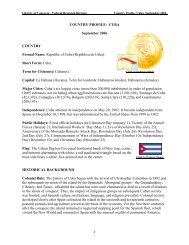1 - American Memory
1 - American Memory
1 - American Memory
You also want an ePaper? Increase the reach of your titles
YUMPU automatically turns print PDFs into web optimized ePapers that Google loves.
26<br />
For all practical purposes, Hawaii's umbilical cord to the rest of<br />
the world is surface shipping. Cut off or squeeze this lifeline and<br />
Hawaii will wither. This is a cruel, unjust and unnecessary blow to<br />
800,CMX) innocent bystanders.<br />
The State of Hawaii presently depends on average of 18 scheduled<br />
cargo vessels and 5 barges a month for almost every type of product<br />
necessary to modern living. In the opposite direction, these ships and<br />
barges carry our agricultural products to mainland markets.<br />
In the short run we feel the lack of shipping from the west coast to<br />
Hawaii immediately. In the long run, the inability to ship and sell our<br />
products is even more damaging since our mainland customers are<br />
tempted to turn to more reliable suppliers and their business is lost<br />
to us forever.<br />
In addition to scheduled carriers, it is true that Hawaii plays host<br />
to numerous other ships, including cruise ships, unscheduled cargo<br />
ships, petroleum carriers, military vessels and other freighters which<br />
stop in Hawaii but do not discharge cargoes. Whether these unsched-<br />
uled ships are operating is of some consequence—especially the petro-<br />
leum carriers—-but in the history of west coast—Hawaii shipping<br />
stoppages, these tramp steamers have not deeply affected the economy<br />
or welfare of the State of Hawaii one way or the other.<br />
Given this background, it is easy to understand the drastic and often<br />
disastrous effects of shipping stoppages on Hawaii. Let me restate<br />
what one of Hawaii's leading economists, Dr. Thomas Hitch, said to<br />
us about Hawaii's prolonged shipping problems:<br />
During past maritime strikes of 2 months or longer, the effects locally have<br />
been a slowdown in construction: increase In unemployment and underemploy-<br />
ment; declines in total personal income, retail trade and tourist arrivals; price<br />
increases and business failures.<br />
Thus, it takes a stoppage of only 2 months before the disastrous pat-<br />
tern of unemployment and business failure becomes acute.<br />
Naturally, Hawaii's business communitj' is the first segment of the<br />
population to be hit when a shipping stoppage occure. During the<br />
1971-72 strike, local merchants suffered sales declines ranging from<br />
17 to 30 percent, with the drop in profits even more marked because of<br />
extra inventory and transportation costs. Large businesses survived<br />
but many smaller ones failed because they could not afford warehouse<br />
space to stockpile goods or the increased cost of air transportation.<br />
Every index of the economy shows the effect of these shipping stop-<br />
pages. During the 1971-72 strike, a marked decrease in Hawaii's gen-<br />
eral fund tax collections indicated the damage incurred by our busi-<br />
nessmen. In the fiscal year ending June 1971, just before the strike<br />
began, State tax revenues had increased 9 percent. During the next 5<br />
months, during the strike and shortly afterward, tax revenues in-<br />
creased only 2.8 percent. This is a 6.2-percent drop in tax revenues.<br />
And the fiscal year ending June 1972 showed only a 4.4-percent in-<br />
crease, half the previous year's gains.<br />
Unemployment is another economic index which reflects the impact<br />
of shipping stoppages. During the 1971-72 strike, Hawaii experienced<br />
its second worst spell of unemployment in modern history—the worst<br />
had occurred during the 177-day strike of 1949. In July 1971, the<br />
number of unemployed in the State of Hawaii was at a rate of 5<br />
percent. By November 1971, after the strike had been in effect 100



![Albert Einstein Papers [finding aid]. Library of Congress. [PDF ...](https://img.yumpu.com/21604228/1/190x245/albert-einstein-papers-finding-aid-library-of-congress-pdf-.jpg?quality=85)





![American Colony in Jerusalem Collection [finding aid]. Library of ...](https://img.yumpu.com/17941275/1/190x245/american-colony-in-jerusalem-collection-finding-aid-library-of-.jpg?quality=85)



![Piccard Family Papers [finding aid]. - American Memory - Library of ...](https://img.yumpu.com/17941234/1/190x245/piccard-family-papers-finding-aid-american-memory-library-of-.jpg?quality=85)


